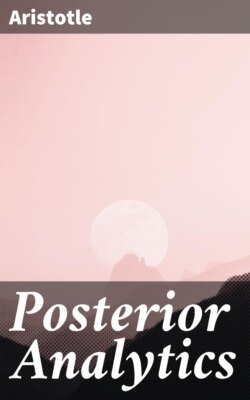Posterior Analytics

Реклама. ООО «ЛитРес», ИНН: 7719571260.
Оглавление
Aristotle . Posterior Analytics
Posterior Analytics
Table of Contents
Book I
Book II
Chapter I: Whether a Demonstrative Science exists
Chapter II: What Knowing is, what Demonstration is, and of what it consists
Chapter III: A refutation of the error into which some have fallen concerning Science and Demonstration
Chapter IV: The meaning of ‘Distributive,’ ‘Essential,’ ‘Universal’
Chapter V: From what causes mistakes arise with regard to the discovery of the Universal. How they may be avoided
Chapter VI: Demonstration is founded on Necessary and Essential Principles
Chapter VII: The Premises and the Conclusion of a Demonstration must belong to the same genus
Chapter VIII: Demonstration is concerned only with what is eternal
Chapter IX: Demonstration is founded not on general, but on special and indemonstrable principles; nor is it easy to know whether one really possesses knowledge drawn from these principles
Chapter X: The Definition and Division of Principles
Chapter XI: On certain Principles which are common to all Sciences
Chapter XII: On Questions, and, in passing, on the way in which Sciences are extended
Chapter XIII: The difference between the Demonstration and Science of a thing’s Nature and those of its Cause
Chapter XIV: The figure proper to Demonstrate Syllogism
Chapter XV: On immediate negative propositions
Chapter XVI: On ignorance resulting from a defective arrangement of terms in mediate propositions
Footnotes
Chapter XVII: On ignorance resulting from a defective arrangement of terms in immediate propositions
Chapter XVIII: On ignorance as resulting from defective sense perception
Chapter XIX: Whether the Principles of Demonstration are finite or infinite
Chapter XX: Middle terms are not infinite
Chapter XXI: In Negations some final and ultimate point is reached where the series must cease
Chapter XXII: In Affirmations some final and ultimate point is reached where the series must cease
Chapter XXIII: Certain Corollaries
Chapter XXIV: Whether Universal or Particular Demonstration is superior
Chapter XXV: That Affirmative is superior to Negative Demonstration
Chapter XXVI: Direct Demonstration is superior to Reduction per impossible
Chapter XXVII: What science is more certain and prior, and what less certain and inferior
Chapter XXVIII: What constitutes one or many Sciences
Chapter XXIX: Concerning many Demonstrations of the same thing
Chapter XXX: On fortuitous occurrences
Chapter XXXI: Sense perception cannot give Demonstrative Science
Footnotes
Chapter XXXII: On the difference of Principles corresponding to the difference of Syllogisms
Chapter XXXIII: The distinction between Science and Opinion
Footnotes
Chapter XXXIV: On Sagacity
Chapter I: On the number and arrangements of Questions
Chapter II: Every question is concerned with the discovery of a Middle Term
Chapter III: The distinction between Definition and Demonstration
Chapter IV: The Essence of a thing cannot be attained by Syllogism
Chapter V: Knowledge of the Essence cannot be attained by Division
Chapter VI: The Essence cannot be proved by the Definition of the thing itself or by that of its opposite
Chapter VII: Whether the Essence can in any way be proved
Chapter VIII: How the Essence can be proved
Chapter IX: What Essences can and what cannot be proved
Chapter X: The nature and forms of Definition
Chapter XI: The kinds of Causes used in Demonstration
Footnotes
Chapter XII: On the Causes of events which exist, are in process, have happened, or will happen
Footnotes
Chapter XIII: On the search for a Definition
Footnotes
Chapter XIV: On the discovery of Questions for Demonstration
Footnotes
Chapter XV: How far the same Middle Term is employed for demonstrating different Questions
Chapter XVI: On inferring the Cause from the Effect
Chapter XVII: Whether there can be several causes of the same thing
Chapter XVIII: Which is the prior cause, that which is nearer the particular, or the more universal?
Chapter XIX: On the attainment of Primary Principles
Footnotes
Appendix
Chapter XXIII: On Induction
Chapter XXIV: On Example
Отрывок из книги
Aristotle
Published by Good Press, 2021
.....
Chapter XXVII: What science is more certain and prior, and what less certain and inferior
Chapter XXVIII: What constitutes one or many Sciences
.....